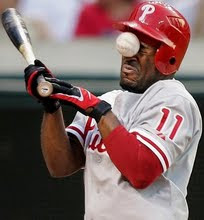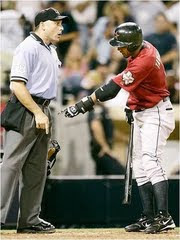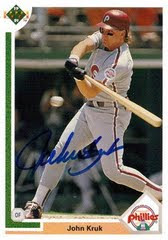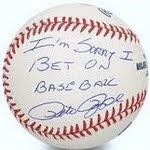Depending on when a given event occurs in a baseball game, it will have a different impact on the runs scoring differential. A single, for example, is worth almost twice as much with a runner on first than it is with the bases empty. These events, based on when they occur, are compared through the use of linear weights (or relative valuation).
The linear weight system is interesting because it lets us see what would happen to runs scoring in theory if we substituted one event for another. For example, what happens to run scoring if a hitter improves his patience at the plate by also increasing the number of times strike three is called. According to Tom Tango's Men On Base Linear Weight System (MOBLWTS), a base on balls is, on average across all possible events, worth +0.35 runs, while a strikeout is comparably worth -0.31 runs. Thus, a player who improves his walk rate at the expense of a comparable decline in strikeout rate is actually improving his runs output.
 A few years ago, Ichiro claimed that he intentionally sacrifices power for batting average. Would hitting 40 home runs at the expense of a lower batting average, and thus on base, really hurt Ichiro's run scoring output? Let us examine.
A few years ago, Ichiro claimed that he intentionally sacrifices power for batting average. Would hitting 40 home runs at the expense of a lower batting average, and thus on base, really hurt Ichiro's run scoring output? Let us examine.Under that linear system, the average home run is worth +1.42 runs, while the average single is worth +0.49 runs. This means that a home run is roughly equivalent to 2.9 singles. Ichiro has averaged about 8.5 home runs in his nine-year major league career. If we assume that Ichiro could hit 40 homers, that means that he would need to increase his home run output by 31.5 to match his claimed ability.
Using the relative weight of home runs to singles and singles to outs (assuming all non-home run hits sacrificed by Ichiro would be outs), we get a proportion of 1.42(Y)-.30(X-Y)=.49(X), where X equals the number of singles Ichiro would have to hit to "break even" in regard to his run-creation output.
Simplifying the equation, we get: X = 2.18Y. Plugging in the relevant numbers, we find that to "break even," Ichiro would need to hit these additional 31.5 home runs at the expense of 68.5 (or fewer) singles. Ichiro averages about 678 at-bats per season with a batting average of .331 (~224 hits). The loss of 68.5 singles (again, we are pessimistically assuming that all of Ichiro's forgone singles would become outs) would cause Ichiro's batting average to plummet to approximately .229.
Hence, if, as Ichiro claims, he could hit 40 home runs at the cost of a .220 batting average, then he should not do it. Exacerbating the issue, as a commenter points out below, would be that a loss in batting average would also depress Ichiro's on base and stolen base value, which would further lower his overall wOBA. Still, the issue would be a closer one if "Ichiro with power" was be capable of mustering a batting average that is competitive with the likes of Mike Cameron, Adam Dunn, and Russell Branyan, the trade off may be worth it. As is stands, however, ".220 Ichiro" should keep on slapping singles...
What do you think?







0 comments:
Post a Comment